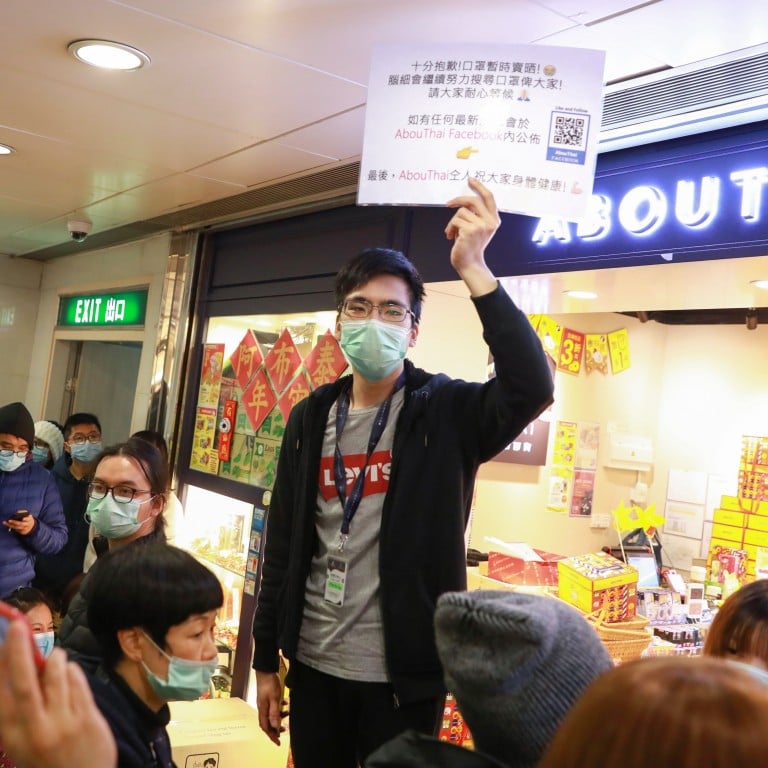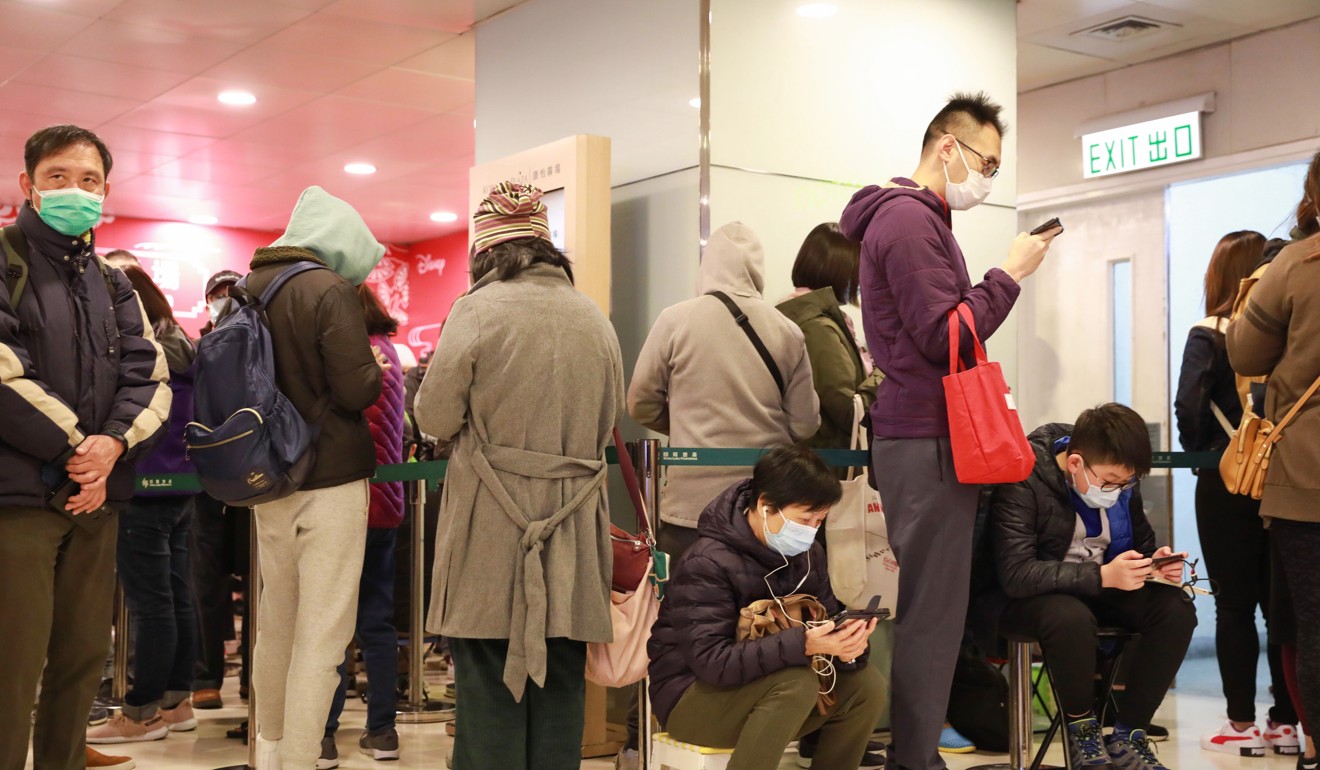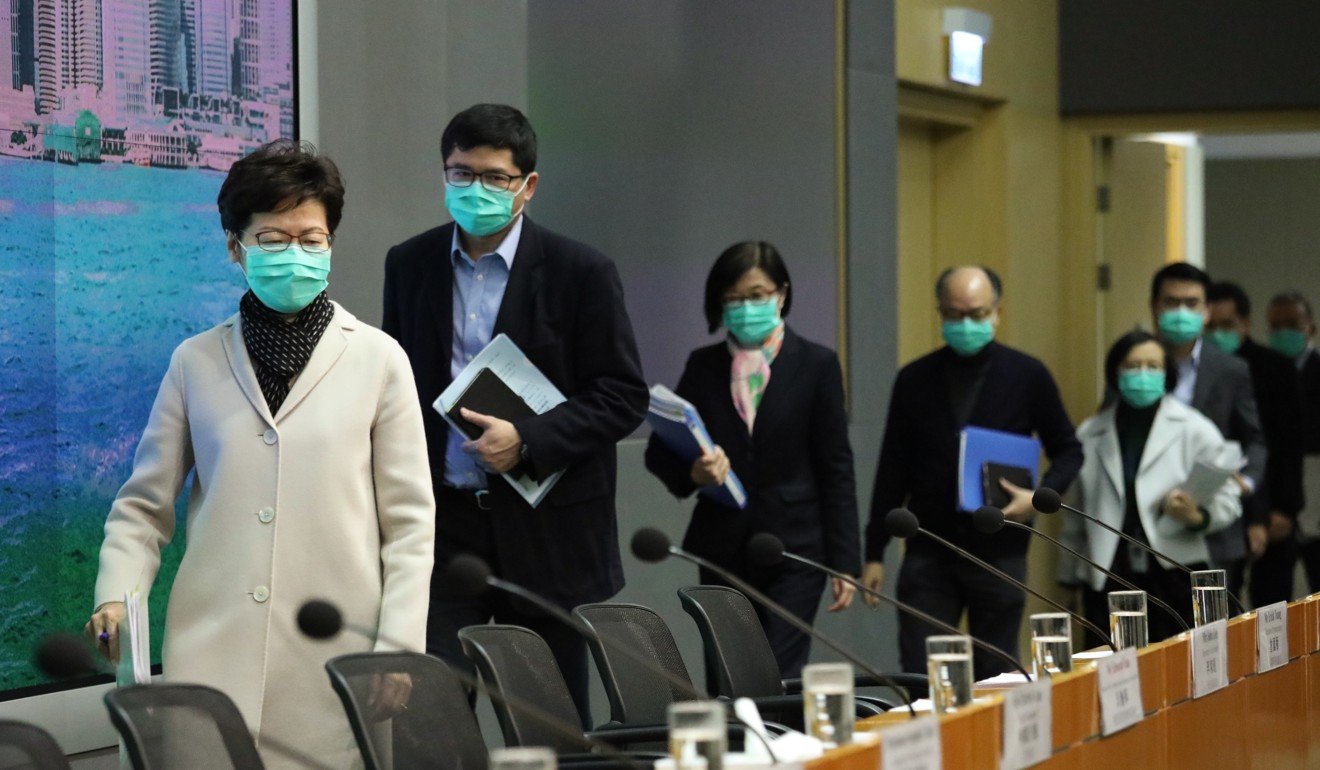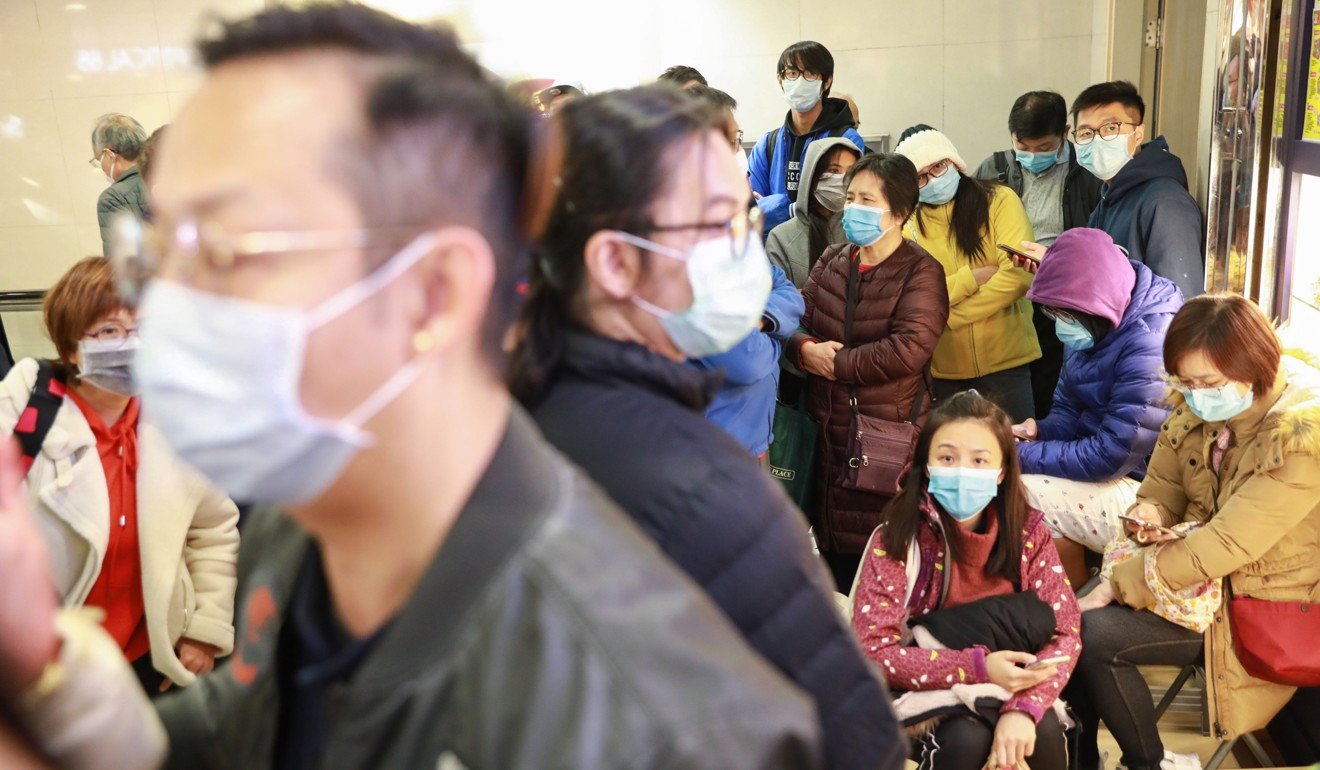
Long queues at outlets across Hong Kong selling masks, as panic buying continues amid Wuhan coronavirus outbreak
- Government blamed for only partial border closures with mainland, while authorities accused of not ensuring steady supply of protective gear
- Commerce and Economic Development Bureau says it has met retailers and urged those with shipment issues to contact it for help
Hundreds of people queued up for face masks across Hong Kong on Wednesday amid a shortfall of protective gear in a city gripped by the Wuhan coronavirus outbreak.
At some outlets of Thai lifestyle chain AbouThai – which has 14 stores citywide – some buyers showed up as early as 7am – five hours before new batches of masks arrived for retailers.
Many accused the government of failing to assuage fears after Chief Executive Carrie Lam Cheng Yuet-ngor announced a partial border shutdown with the mainland, instead of a complete closure as suggested by lawmakers and health care workers’ unions.
Hong Kong recorded two more cases of infections after a two-day lull, bringing the local total to 10, while on the mainland, the number of cases has crossed 6,000, with more than 130 deaths.

In a statement, the Commerce and Economic Development Bureau said it had met members of the retailing and business sectors over the availability of protective products on Wednesday, but did not give updates on the government’s pledge to ramp up supply of surgical masks in the city.
“The government will do everything possible, and through discussing and cooperating with the business sector, increase the supply of protective resources,” it said.
The bureau added that importers who had problems with shipment clearance could provide information for follow-ups.

University of Hong Kong microbiologist Dr Ho Pak-leung estimated that the city would consume about 300 million surgical masks monthly amid the outbreak.
“For a person who needs to go outside … they will use up to three disposable masks,” Ho said. “If 1 million belong to this category, that’s 3 million masks per day, 90 million per month.”
He also said health care workers in public hospitals used as many as 300,000 masks daily at the peak of the 2003 severe acute respiratory syndrome epidemic.
Lam Wai-man, chairman of the Hong Kong General Chamber of Pharmacy, said 80 per cent of surgical masks sold in the city were manufactured on the mainland. As the virus has spread to almost all provinces in China, he said the internal demand for masks was large and Hong Kong “will have to queue”.
“We’ve asked Indonesia, Malaysia, Taiwan, South Korea and Japan, who all said they have no stock,” Lam added.
He also said while the bureau had promised to help importers on matters of clearance, this depended on whether there were any shipments at all.

At AbouThai’s Tai Koo outlet, hundreds of people formed a massive queue, but only 300 boxes of masks were distributed, leaving many disappointed.
Its outlets at Tai Po, Hang Hau and Diamond Hill were also crowded on Wednesday morning before opening hours. Each customer was limited to one box of 50 masks. A box cost HK$68, but prices varied depending on type and brand.
Jeffrey Chen, 28, who works in the creative industry, said he was the 21st person in a line of 300 at Tai Koo. He started queuing at 8.30am and the first few before him had arrived at 7am.
Demand for masks surges, as government denies stockpiling gear for internal use
Chen, who lives with his family of five including his wife, who is pregnant, said he had been searching for masks nearly every morning over the past few days, but always left empty-handed.
“They were all sold out, and it was not just masks, but also disinfection products such as alcohol and bleach,” he said, adding that his family had avoided going out, and were down to three or four boxes of masks at home.
Another man, in his 60s and who gave his surname as Sit, had queued up for more than four hours from 8am. “We don’t know when the epidemic is going to end, and we also don’t know whether there will be a continuous mask supply in future,” he said.
While the retail chain has given staff from the Hospital Authority, as well as health, immigration, and customs officers priority to buy masks, such government workers were also required to queue up at the Tai Koo outlet because of the surge in demand.
An immigration officer surnamed Ho, 25, said he felt saddened by the scenes, criticising the government for only closing six of 14 border checkpoints.
“These measures are too late, although that’s still better than nothing … It’s worrying especially for people like us who have to work at borders and come into contact with many people from the mainland,” he said.
Face mask prices soar as residents scramble to stock up
A nurse, who identified herself as Mary Chan, said she worked at an isolation ward in a public hospital. Chan said the government should have done more to ensure a steady supply of masks for the public.
“If the government can make such a promise, at least everyone won’t be so worried, for instance, they could have followed in the footsteps of Taiwan, which stopped exporting masks, or act like Macau, which has officially imposed quotas on individual purchases.”
They could have followed in the footsteps of Taiwan, which stopped exporting masks, or act like Macau, which has officially imposed quotas on individual purchases
Meanwhile, two distributors of surgical masks in Hong Kong said they were out of stock and unsure of when next shipments were due.
In a message to private clinics, the Hong Kong office of medical supply firm Henry Schien said it was out of masks and alcohol hand sanitisers. “As to when we can restock and ship orders out, we do not know at this moment.”
A staff member said the company’s local office had tried to get more stock globally, but in vain.
Another distributor, Full Yield (Asia), said all its stock had been reserved by the government. A staff member said he was uncertain about future supply, as the factory in mainland China had not fully resumed work amid the Lunar New Year holiday. He expected the next shipment to come in mid to late February, and described the local supply of masks as “scarce”.
The mask shortage has also affected those in the medical equipment business, where staff members frequent local hospitals for client calls. John Szeto Yat-sing, 45, owner of a medical equipment trading firm, went as far as Poland to source 15,000 surgical masks for his employees and their families.
Szeto said he found a Polish site to place the order on, but needed help from a native firm to overcome language and shipping barriers. He said it was easier to order surgical masks during the 2003 Sars epidemic, adding: “Now everyone can shop online and the demand is global.”
The cost of a box of 50 masks from Poland was about HK$16 before shipping, he said, adding he was not sure if his elaborate plan would work out.
The owner said the government should have done more for Hongkongers.
“The government and the Hospital Authority should have used their bargaining power and made batch orders directly from manufacturers earlier.”


